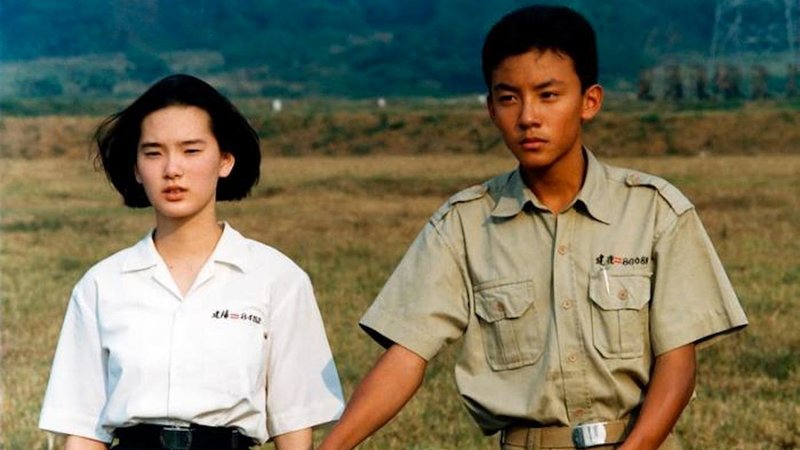Edward Yang's magnum opus is one of the greatest films of cinema's first hundred years, a sprawling, intimate coming-of-age drama set amidst gang warfare in 60s Taipei.

Screened as part of NZIFF 2008
A Brighter Summer Day 1991
Guling jie shaonian sha ren shijian
It’s a question that’s almost as ridiculous to ask as it is to answer, but if pressed to name my all-time favourite film, this would be the one. A Brighter Summer Day may not be the greatest film ever made, but it’s the greatest one I’ve seen.
This is where Edward Yang’s ambition and accomplishment as a director reached its zenith, and it’s one of the very few films I know that exhibits the density, subtlety and complexity – narrative, thematic and psychological – of the great novels. Its complex of allusions to Tolstoy are absolutely to the point.
The story revolves around Xiao Si’r (Crouching Tiger and 2046 star Chang Chen, debuting here at age 13), a young boy growing up in the destabilising environment of 1960 Taipei, in the shadow of both Communist China and burgeoning Western popular culture, and trying to reconcile the competing demands of school, tentative romance and the gang warfare erupting around him.
The film presents a vast tapestry representing a specific culture at a specific time – there are more than 20 significant characters for you to discover and a dozen or more interweaving plot threads to untangle – but the themes and issues Yang addresses are universal. A Brighter Summer Day may be Yang’s most penetrating examination of the ethics of vision, and patterns of light and darkness, vision and blindness, are an essential part of the film’s DNA. One of the motors of the plot is the changing understandings of exactly what is revealed in an opening scene by a casually strewn torch beam, and this patterning extends to several of Yang’s coups de cinéma. A crucial encounter between Xiao Si’r and Ming happens just offscreen, their figures reflected in the high-gloss sheen of a painted door; a climactic gang fight occurs during a blackout, its action conveyed solely by the soundtrack. Yang was one of the most sophisticated and creative users of film sound, and the soundtrack of a given scene will often convey more, or different, information than its visuals.
This is an incredibly rich film that yields more with every viewing. This will be the first time New Zealand audiences have had the opportunity to see one of cinema’s modern masterpieces in its complete form, its only previous screenings, in 1991 festivals, being of a shortened 3-hour edit demanded by the producers. — AL
“Rarely screened and unavailable on DVD, A Brighter Summer Day has been described as a Taiwanese Rebel Without a Cause (1955) – a true descriptor if one discounts the very specific mise en scène of early 60s Taipei and the film's dense connective web of cultural, political, and familial allusions, obligations, and affiliations, one that's as many-tendrilled and enmeshing as that of your average multigenerational Chinese family.
“Ensnared by filial duty as well as street gang politics and placed in the sweepingly de-centered core of Day is its proto–James Dean, Xiao Si'r, portrayed by the baby-faced Chang Chen (the nomadic hottie in Yang's Taiwanese cohort Ang Lee's Crouching Tiger, Hidden Dragon [2000]). The director opens Day with Si'r's Shanghainese intellectual father arguing with teachers about his son's grades, and then widens his aperture imperceptibly, ingeniously onto the arboreal byways, flat-lit classrooms, vertigo-inducing corridors, and shadowy hideouts of Si'r's world. It's a realm in which the children of the Kuomintang live an uneasy existence much like their elders: residing in Japanese houses less than 20 years after their parents fought the Imperial army on the mainland, these Taiwanese teens listen to American doo-wop and early rock and form street gangs that parallel the battling political factions of the People's Republic. Tanks rumble by as brownouts underline the sense of rupture.
“Resembling in its panorama and chapterlike parts such historical epics as Bernardo Bertolucci's 1900 (1976), Day unfurls like a scroll, peppered by the shouts and orders of parents, peddlers, and teachers, and peopled with pungent characters like the Tolstoy-reading, romantically heroic hood Honey and his guilelessly calculating survivor of a sweetheart Ming – as well as Si'r's bookish father, who's torn from his self-absorption when taken into custody by the secret police. All bear the marks of severance from one's past, papers, homeland, and other familiar signposts of identity. The quiet, troubled, and piercing irony that Yang applies to the scene of Si'r's father's arrest, one in which his children repeatedly play Presley's ‘Are You Lonesome Tonight’ in order to translate the lyric "Does your memory stray to a brighter summer day" to sing at some future sock hop haunted by the specter of Honey's death – shades of the Jesus and Mary Chain – makes this teeming opus worth turning over again and again in your own memory. It's like a battle hymn to a faltering family, or a love song to the death of innocence.” — Kimberly Chun, San Francisco Bay Guardian